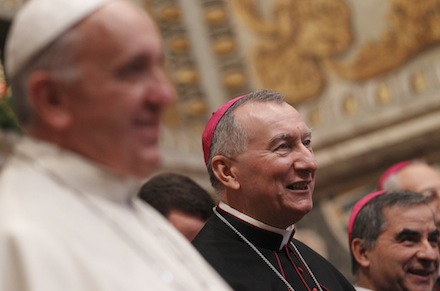Trump can’t dictate China policy to the Pope, says Vatican’s top diplomat
ROME – The Vatican’s top diplomat has said that a controversial deal with China on the appointment of bishops will continue “regardless of reactions that may come from America” during the new Trump administration. Italian Cardinal Pietro Parolin, the Vatican’s Secretary of State, spoke to reporters on the sidelines of an event at Rome’s Jesuit-run The post Trump can’t dictate China policy to the Pope, says Vatican’s top diplomat appeared first on Catholic Herald.

ROME – The Vatican’s top diplomat has said that a controversial deal with China on the appointment of bishops will continue “regardless of reactions that may come from America” during the new Trump administration.
Italian Cardinal Pietro Parolin, the Vatican’s Secretary of State, spoke to reporters on the sidelines of an event at Rome’s Jesuit-run Gregorian University on artificial intelligence and international humanitarian law.
Asked about tensions that arose between the White House and the Vatican over China during the previous Trump administration, which included then-Secretary of State Mike Pompeo warning that the Vatican risked “losing its moral authority” for its approach to Beijing, Cardinal Parolin indicated there would be no change of course.
“We’ve gone forward with China regardless,” Cardinal Parolin said. “We renewed the accord for another four years,” he said, referring to the most recent renewal in October.
“The dialogue [with China] continues, in small steps but it continues,” he said. “I confirm this approach, regardless of reactions that may come from America.”
Veteran Italian political analyst Massimo Franco called Cardinal Parolin’s comments “a preventive move in view of an attack the [Trump] administration against the strategy of détente between Pope Francis and the regime of Xi Jinping”.
In a piece for Corriere della Sera, Italy’s newspaper of record, Franco suggested that Pope Francis and his allies may be concerned with the support for Trump and his hard line on China among conservative Catholics in America and elsewhere.
It’s a constituency, Franco wrote, “which has often demonstrated antipathy toward Francis, and which is connected with conservative Catholicism throughout the west. It’s an area [of the church] which is a minority only in appearance, influential and with large financial resources. In view of a conclave, it could also underline its dissent using the theme of China.”
In his comments to reporters, Cardinal Parolin insisted that the Vatican’s interests with China are essentially “ecclesial”, meaning not political or strategic.
It’s necessary, he said, “to leave behind a political conception [of the deal] present in many evaluations by governments and countries,” he said, adding that on the basis of these ecclesial concerns, “the Holy See seeks to go forward.”
Despite the clear difference over China, Parolin insisted that U.S./Vatican relations won’t change under a new Trump administration, just as they didn’t during his first term.
“As always, there are elements that bring us together and others that perhaps distinguish us, that put distance between us,” he said.
“This will be the occasion for exercising dialogue and seeking together to find new points of consensus, always serving the common good and peace in the world.”
Parolin was also asked about Trump’s vow to carry out the largest mass deportations of illegal immigrants, urging the new administration to adopt a “wise policy” which “doesn’t arrive at these extremes”.
“The Pope has given very precise, very clear indications on this theme,” he said. “I believe it’s the only way to deal with the problem and to resolve it in a humane manner.”
Cardinal Parolin also reacted to Trump’s declaration on the campaign trail that “I won’t start wars, I’ll end them.”
“Let’s hope so, let’s hope so, let’s hope so,” he said, adding: “I don’t believe that even he has a magic wand.”
To end wars, Cardinal Parolin said, requires “a great deal of humility, openness, and a search for the general interests of humanity rather concentrating on special interests. That’s what I hope for”.
Cardinal Parolin counselled against either exaggerated hope or fears for Trump’s approach to wars currently underway in Ukraine and Gaza.
“There’s that famous phrase, ‘the war will end the day after’. But how?” Parolin asked. “No one’s been able to say, and not even [Trump] has given concrete indications as to how. Let’s see what he’ll propose once he takes office.”
On the “life issues,” especially abortion, Cardinal Parolin acknowledged it’s an area where Trump and the Vatican have something in common, but said he hopes the new administration won’t pursue its agenda in a divisive fashion.
Cardinal Parolin recommended a “shared policy” one that seeks to “unify agreement” and “not become yet another policy of polarisation and division”.
In general, Cardinal Parolin voiced good wishes for the new President.
“At the beginning of his term, we wish him great wisdom, because it’s the principal virtue of governors according to the Bible,” Cardinal Parolin said.
“I believe he must work above all for being President of the entire country, overcoming the polarisation which has occurred, which has been felt in a very sharp way in this period,” he said, adding that he hopes the new American leader will contribute to ending “conflicts which are currently making the world bloody”.
(CNS photo)
![]()
The post Trump can’t dictate China policy to the Pope, says Vatican’s top diplomat appeared first on Catholic Herald.














